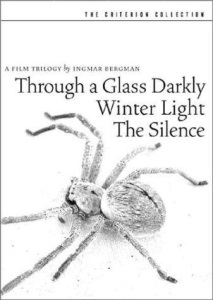Winter Light (1963)
February 18, 2021 5:13 PM - Subscribe
A small-town pastor struggles with his faith.
General reviews:
Bosley Crowther [NYT] in a contemporary review notes whatever Bergman's intentions, he cannot but have known the film would be judged for its symbolism.
Roger Ebert deems it a Great Movie, but his review unusually doesn't offer too much deep insight.
Essays and interpretations:
Peter Cowie at Criterion Collection
This person sees the ending as the pastor regaining some semblance of faith.
The first comment under the OP here makes a good argument the pastor is a narcissist who seemingly recovers his faith at the end because he sees himself as Christ being forsaken on the Cross rather than actually having some kind of personal conversion.
"Bergman’s film is one of cinema’s great comedies, consistently producing the kind of hard, hearty laughter that nourishes the soul."
One review posits that the woman the pastor is having a relationship with is at the heart of the movie.
Or in the end the film could just be Bergman confronting his viewers with two people who are stuck going through the motions of their miserable lives.
Poster's thoughts:
I've been meaning to post this one for awhile after seeing a certain movie from a few years that took quite a bit from this film among others. Check out Winter Light. It's streaming at Criterion and occasionally at TCM.
General reviews:
Bosley Crowther [NYT] in a contemporary review notes whatever Bergman's intentions, he cannot but have known the film would be judged for its symbolism.
Roger Ebert deems it a Great Movie, but his review unusually doesn't offer too much deep insight.
Essays and interpretations:
Peter Cowie at Criterion Collection
This person sees the ending as the pastor regaining some semblance of faith.
The first comment under the OP here makes a good argument the pastor is a narcissist who seemingly recovers his faith at the end because he sees himself as Christ being forsaken on the Cross rather than actually having some kind of personal conversion.
"Bergman’s film is one of cinema’s great comedies, consistently producing the kind of hard, hearty laughter that nourishes the soul."
One review posits that the woman the pastor is having a relationship with is at the heart of the movie.
Or in the end the film could just be Bergman confronting his viewers with two people who are stuck going through the motions of their miserable lives.
Poster's thoughts:
I've been meaning to post this one for awhile after seeing a certain movie from a few years that took quite a bit from this film among others. Check out Winter Light. It's streaming at Criterion and occasionally at TCM.
I also never felt that the warden’s speech helped the pastor regain his faith. Rather, I thought one point the film made whas that the pastor could not be consoled, not by the love of God (i.e. Martha) and not by the suffering of Christ (i.e. the warden). Both provide a contrast: Martha’s love without faith against the pastor’s faith without love, and the warden looking at the cross against the pastor (indeed rather narcistically) seeing himself on the cross.
The pastor is in both cases shown to be unfruitful: while the warden finds meaning in the gospel and while Martha’s love eventually drives her to prayer, the pastor – unable of being consoled – cannot say a single word of consolation to the poor fisherman and ends the film with words he now has confessed to being meaningless. God does not speak to neither Martha nor the warden, but only to the pastor does God become silent.
That is anyway how I understood the film. Of course, the reviews you posted above all have different interpretations of the final scene, all plausible, showing the wonderful ambiguity that makes this film such a rich source of allegory. Thank you for putting together this excellent post!
posted by trotz dem alten drachen at 10:31 AM on February 19, 2021
The pastor is in both cases shown to be unfruitful: while the warden finds meaning in the gospel and while Martha’s love eventually drives her to prayer, the pastor – unable of being consoled – cannot say a single word of consolation to the poor fisherman and ends the film with words he now has confessed to being meaningless. God does not speak to neither Martha nor the warden, but only to the pastor does God become silent.
That is anyway how I understood the film. Of course, the reviews you posted above all have different interpretations of the final scene, all plausible, showing the wonderful ambiguity that makes this film such a rich source of allegory. Thank you for putting together this excellent post!
posted by trotz dem alten drachen at 10:31 AM on February 19, 2021
You are not logged in, either login or create an account to post comments

That's pretty much what I got from it, honestly.
I thought it was great.
posted by kyrademon at 5:54 AM on February 19, 2021